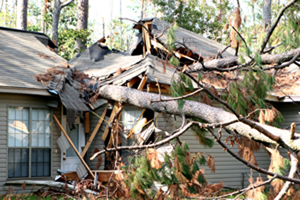 In South Carolina, homes are at risk to a number of weather conditions that can cause trees to fall, which can result in extensive roof and interior damage. While older and diseased trees are more vulnerable to extreme weather and high winds, even healthy trees can topple under these conditions.
In South Carolina, homes are at risk to a number of weather conditions that can cause trees to fall, which can result in extensive roof and interior damage. While older and diseased trees are more vulnerable to extreme weather and high winds, even healthy trees can topple under these conditions.
Falling trees and limbs cause millions of dollars in damage each year. When something of this magnitude happens to your home, there are a number of steps you’ll need to take. From tree removal to roof repair and everything in between, learn what to do to fully recover:
- Evacuate immediately
-
If you are on a second or third story, get to the main floor as quickly and safely as possible. If there is debris blocking a door, you may have to find an alternate exit through a window. Safety is first and foremost. Make sure everyone is accounted for and unharmed.
- Call for help
-
If you are in a situation where you cannot safely exit your home, call emergency services for assistance. Also, if power lines or wires are down from the storm damage, you’ll need to call the police and contact the power company.
- Make emergency repairs
-
Sometimes fallen trees can expose the interior of your home, making it susceptible to additional weather damage. Take steps to protect your home if you can safely do so, such as covering anything that could be damaged with plastic tarps or a weather-resistant material, locking your doors and securing any valuables before leaving the property. If it is unsafe to do this yourself, call a reputable contractor to tarp or board up broken windows and any holes in the roof or sides of your home. This step will protect your home’s interior and your belongings from additional weather damage. Mitigating property from further damage is crucial.
- Document the damage
-
Take photos or a video of the damage—both outdoors and indoors—as soon as all immediate danger has passed. Don’t leave anything out; the documentation is vital as evidence for your insurance claim.
- Alert Farm Bureau Insurance®
-
Report the property damage as soon as possible to your insurance agent or call our Customer Service Call Center toll-free at 1-800-799-7500 to begin the claims process. You’ll be assigned a claims adjuster who will thoroughly assess the damage and evaluate whether it is a covered claim.
As a reminder, if an “act of God”—such as thunderstorms, high winds, or ice storms — caused the tree to fall, your policy will cover the repair expenses, minus any deductible, on the house, in most cases. Your policy may even pay if the fallen tree belongs to a neighbor in an “act of God” situation. Your claim could be denied, however, if it was caused by negligence.
You will likely have a deductible before your insurance will help pay for a covered loss and coverage limits will apply. If you’re like most homeowners, you probably haven’t reviewed your policy in detail, so go through it now so you know what to expect. It’s important to understand your deductibles before disaster strikes, but if you have questions, you can always contact your agent.
- Agree on the amount of your claim before making permanent repairs
-
Wait to make any permanent repairs until the amount of your claim is determined. Depending on your policy, the repair work may exceed your limits. If repair costs go beyond your policy limits, you may be liable for the balance.
- Save your receipts
-
Keep track of all expenses related to the damage. Expenses incurred for emergency damage control are usually covered, so save your receipts if you had a contractor tarp your roof or board-up windows. If your home is uninhabitable, you may also be reimbursed for some of the expense of temporarily renting an apartment or staying in a hotel. Don’t assume all your expenses will be covered. Review your policy and contact your agent to be certain.
- Only make the final payment when satisfied with the contractor’s work
-
Legitimate contractors often require payment for materials before work begins, but they should never request prepayment for the labor to make the repairs. Contractors may ask for partial payments on a mutually agreed-upon schedule if the repairs are extensive and will take time, but the final payment should be made only when the repairs are complete to your satisfaction.
Learn how to avoid contractor fraud and abuse. It is important to always be cautious when hiring the contractors to clean up and repair storm damage. While most contractors are honest and reputable, others are not.